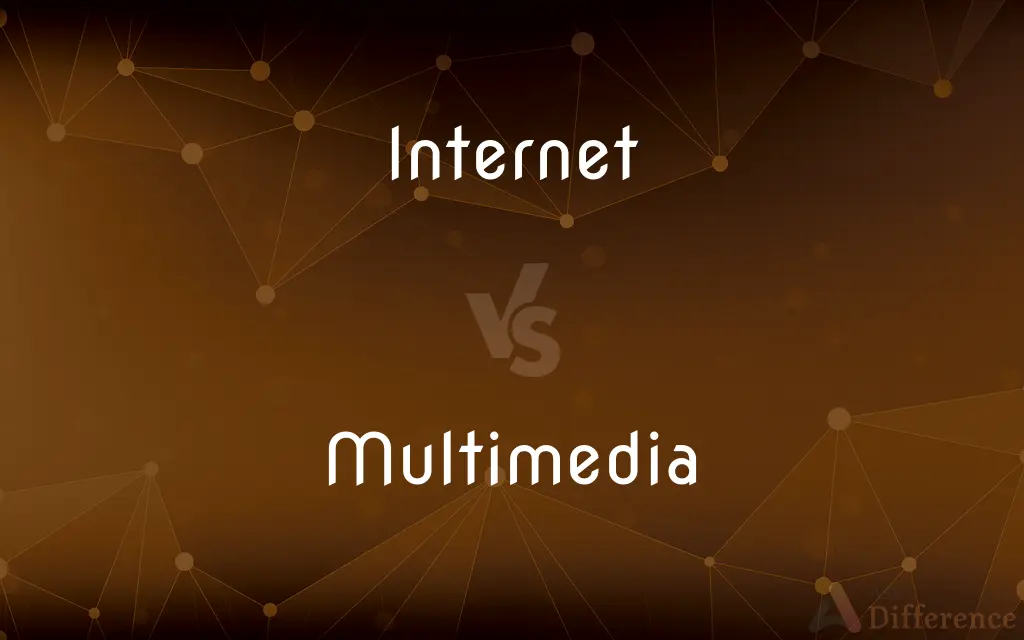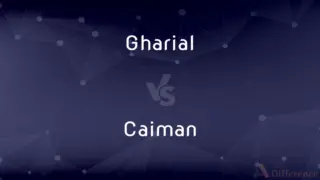Internet vs. Multimedia — What's the Difference?
Edited by Tayyaba Rehman — By Fiza Rafique — Updated on April 8, 2024
The Internet is a global network for information exchange, while multimedia combines text, audio, images, animation, and video to communicate content.

Difference Between Internet and Multimedia
Table of Contents
ADVERTISEMENT
Key Differences
The Internet serves as a vast network connecting computers worldwide, facilitating data exchange, communication, and access to web services. In contrast, multimedia refers to content that uses a combination of different content forms such as text, audio, and video to enhance user engagement and information delivery.
While the Internet provides the infrastructure for online connectivity and access to digital resources, multimedia content can be distributed across the Internet but also exists independently on various media like CDs, DVDs, and local storage. This highlights how multimedia content utilizes the Internet for dissemination but remains a separate entity defined by its format and use of multiple media types.
The development and proliferation of the Internet have revolutionized how multimedia content is created, shared, and consumed, making it more accessible to a global audience. Conversely, the advancement in multimedia technologies has enriched Internet content, contributing to more interactive and engaging web experiences.
Internet technologies focus on protocols and infrastructure for data transmission (e.g., TCP/IP, HTTP), ensuring reliable communication across the network. Multimedia, however, concentrates on content creation, encoding, and compression techniques to efficiently deliver diverse content types like video and audio over various platforms, including the Internet.
The user interaction model also differs significantly: the Internet facilitates interactive services and communication platforms (social media, online forums), whereas multimedia enhances user experience by providing rich, interactive content that can be both informative and entertaining, irrespective of the platform it’s accessed on.
ADVERTISEMENT
Comparison Chart
Definition
A global system of interconnected computer networks.
The integration of multiple forms of media.
Primary Use
Information exchange, communication, and access to web services.
Enhancing content delivery and engagement.
Key Components
Hardware (servers, routers), protocols (TCP/IP, HTTP).
Content types (text, audio, video, animation).
Accessibility
Requires internet connectivity.
Can be accessed online and offline.
User Interaction
Facilitates interactive services and communication.
Provides rich, interactive content.
Compare with Definitions
Internet
The infrastructure for online communication and information.
The Internet has made global collaboration possible.
Multimedia
Content that uses multiple media elements to inform or entertain.
Multimedia exhibitions combine visuals, sound, and interactive elements.
Internet
A medium for accessing a vast array of services.
Streaming services are accessed via the Internet.
Multimedia
A tool for creating engaging and interactive experiences.
Websites use multimedia to enhance user experience.
Internet
A global network connecting millions of computers for data exchange.
She found the information she needed through an Internet search.
Multimedia
The combination of text, sound, and video in a single presentation.
Educational software often uses multimedia to engage students.
Internet
The backbone of digital age connectivity.
Businesses rely on the Internet for daily operations.
Multimedia
Media that goes beyond traditional text to include visual and auditory elements.
Digital signage displays multimedia content for advertising.
Internet
A tool for social interaction and knowledge sharing.
Social media platforms on the Internet connect people worldwide.
Multimedia
A method to convey information more effectively.
Instructional videos combine audio explanations with visual demonstrations.
Internet
A publicly accessible system of networks that connects computers around the world via the TCP/IP protocol.
Multimedia
Of or relating to the combined use of several media
A multimedia installation at the art gallery.
Internet
The Internet (or internet) is the global system of interconnected computer networks that uses the Internet protocol suite (TCP/IP) to communicate between networks and devices. It is a network of networks that consists of private, public, academic, business, and government networks of local to global scope, linked by a broad array of electronic, wireless, and optical networking technologies.
Multimedia
Multimedia is a form of communication that combines different content forms such as text, audio, images, animations, or video into a single presentation, in contrast to traditional mass media, such as printed material or audio recordings. Popular examples of multimedia include video podcasts, audio slideshows and Animated videos.
Internet
Alternative case form of Internet
Multimedia
(Computers) Of or relating to an application that integrates different media, such as text, graphics, video, and sound.
Internet
(uncountable) Internet access or connection; internet connectivity.
Do you have internet at your place? My internet is down and I want to check my email.
Hello everyone, this is your daily dose of internet.
Multimedia
The combined use of sound, video, and text to present an idea.
Internet
(countable)
Multimedia
Of, or relating to this combined use of media
Internet
Any set of computer networks that communicate using the Internet Protocol; an intranet.
Multimedia
(computing) of, or relating to an application that can combine such media into an integrated package
Internet
A fictitious unit of scoring awarded for making outstanding posts on the internet.
Multimedia
Transmission that combine media of communication (text and graphics and sound etc.)
Internet
To use the Internet; specifically, to search for information using the Internet.
Having no idea what that means, I am internetting like mad.
Internet
To entwine or link (several things) together, so as to form a network; to interconnect, to network.
Internet
To connect (a computer, an electronic device, etc.) into a computer network (in particular, the Internet).
Internet
A large network{3} of numerous computers connected through a number of major nodes of high-speed computers having high-speed communications channels between the major nodes, and numerous minor nodes allowing electronic communication among millions of computers around the world; - usually referred to as the internet. It is the basis for the World-Wide Web.
Internet
A computer network consisting of a worldwide network of computer networks that use the TCP/IP network protocols to facilitate data transmission and exchange
Common Curiosities
How has the Internet impacted multimedia?
The Internet has made multimedia more accessible, allowing for its widespread distribution and consumption.
Can multimedia exist without the Internet?
Yes, multimedia can exist independently on local storage media like CDs, DVDs, and computer files, apart from the Internet.
How does multimedia enhance content?
Multimedia enhances content by combining various forms of media, making information more engaging and easier to understand.
What challenges exist in integrating multimedia on the Internet?
Challenges include ensuring compatibility across devices, managing file sizes for efficient delivery, and protecting copyright.
How is multimedia content developed?
Multimedia content is developed using a variety of software tools that allow for the creation and editing of text, audio, video, and animation.
What is the primary function of the Internet?
The Internet's primary function is to provide a global network for information exchange and communication.
Are there specific technologies that support multimedia on the Internet?
Yes, technologies like streaming protocols, compression standards, and web development languages (HTML5, JavaScript) support multimedia on the Internet.
How do protocols and standards affect multimedia on the Internet?
Protocols and standards ensure the reliable transmission and compatibility of multimedia content across different platforms and devices on the Internet.
Can multimedia content be interactive?
Yes, multimedia content often includes interactive elements, such as clickable links or interactive videos, to enhance user engagement.
What role does multimedia play in education?
In education, multimedia is used to create more engaging and effective learning materials that cater to different learning styles.
How do multimedia and the Internet complement each other?
The Internet serves as a distribution channel for multimedia content, while multimedia enriches the content available online, enhancing user experience.
What impact has multimedia had on traditional media?
Multimedia has transformed traditional media, integrating digital elements into print and broadcast media and expanding the ways content is consumed.
Can the use of multimedia improve website engagement?
Yes, incorporating multimedia into websites can significantly improve user engagement by providing a more dynamic and interactive experience.
What future trends are expected in the use of multimedia on the Internet?
Future trends include the increasing use of virtual reality (VR) and augmented reality (AR) to create immersive multimedia experiences.
What is the significance of multimedia in marketing?
In marketing, multimedia is crucial for creating compelling advertising that can attract and retain the attention of potential customers.
Share Your Discovery

Previous Comparison
Gharial vs. Caiman
Next Comparison
Critic vs. ReviewerAuthor Spotlight
Written by
Fiza RafiqueFiza Rafique is a skilled content writer at AskDifference.com, where she meticulously refines and enhances written pieces. Drawing from her vast editorial expertise, Fiza ensures clarity, accuracy, and precision in every article. Passionate about language, she continually seeks to elevate the quality of content for readers worldwide.
Edited by
Tayyaba RehmanTayyaba Rehman is a distinguished writer, currently serving as a primary contributor to askdifference.com. As a researcher in semantics and etymology, Tayyaba's passion for the complexity of languages and their distinctions has found a perfect home on the platform. Tayyaba delves into the intricacies of language, distinguishing between commonly confused words and phrases, thereby providing clarity for readers worldwide.
















































